IOS organises Interactive Session with Nepalese Minister,
Vishwendra Paswan
January 19, 2016 at 162, Jogabai, Institute Building, Jamia Nagar, New Delhi
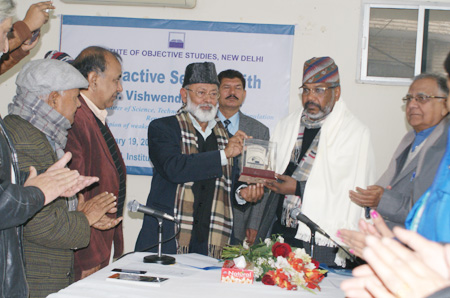
Dr. Mohammad Manzoor Alam, Chairman of the IOS felicitates to Mr. Vishwendra Paswan, Minister of Science, Technology, Environment and Population, Republic of Nepal
The Institute of Objective Studies organised an Interactive Session with the Minister of Science, Technology, Environment and Population, Republic of Nepal, Vishwendra Paswan at its Conference hall on January 19, 2016. Addressing the gathering on the occasion, the minister said that while drafting the new Constitution of Nepal, care had been taken to include all sections of society in order to ensure social justice. Saying that the new constitution was secular and democratic, he insisted that if the reservation to the weaker sections of society was provided in the Constitution, it would prove to be one of the best in the world. He expressed his government’s readiness to amend the Constitution adding that it required consensus among the other stakeholders as a two-third majority was needed to effect a change in the statute. The government was waiting for the response of other political parties, he said. Referring to the minorities, especially the Muslims, he said that their population was 45 lakh and the present Nepalese dispensation was eager to give reservation to them in proportion to their population.
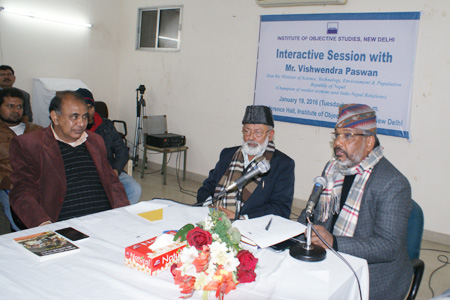
Paswan observed that Nepal was endowed with natural resources in the form of sun which could be used to produce energy, earth for extracting gas, and invited investors from friendly countries, including India, to invest in projects there. He said that industrialists, scientists and scholars from India were welcome to Nepal for benefiting the country with their experience and research. This would go a long way in accelerating the pace of Nepal’s progress and cementing the bond of friendly relations. Admitting that there was some tension between the two countries due to misunderstanding, he said that the ice had started melting and now was the time to take the friendship to new heights. He wanted a positive response from India as a senior partner.
Laying stress on the promotion of cycle programme in which connection he was in Delhi, Paswan said that about 65 percent people of his country used cycle as a mode of transport, but a large population was still without a cycle. He held that about 73 percent Indians used cycle and if the cycles were gifted to his country, the feeling of cooperation and friendship between the two countries would be further strengthened. He urged India to unitedly work for development. Making a demand for the introduction of interest-free banking system in Nepal, he said that his country was impatiently waiting for it, and hoped that a favourable decision on the issue would be taken by the Government of India soon.
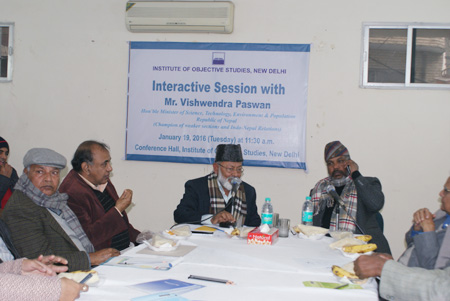
In his presidential remarks the Chairman of the IOS, Dr. Mohammad Manzoor Alam, noted that if the Constitution promoted the spirit of equality and brotherhood, prevented discrimination and guaranteed justice, it would be a positive step towards social justice. Commenting on the system of interest-free banking, he said that as against the general perception that the system was impracticable, he said that the interest-free banking was based on equal sharing of profit and loss. He pointed out that 86 countries of the world, including Russia, were practising interest-free banking and China had made a headway in that direction. He welcomed the guest with a bouquet and presented him with a shawl, a memento and a set of books published by the IOS.
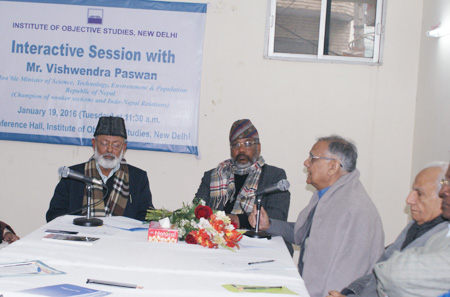
While the Secretary General of the IOS, Prof. ZM Khan, briefly spoke of the activities of the Institute, senior journalist, AU Asif conducted the proceedings. The Vice-Chairman of the IOS, Prof. Refaqat Ali Khan, proposed a vote of thanks. Earlier, the session began with the recitation of a Quranic verse by Hafiz Athar Nadwi. Those who attended the session included Arun Kumar Manjhi, advocate, Prof. Hasina Hashia, Nandlal, Syed Ashraf Rizvi, Safi Akhtar, Qasim Syed, Farhah Azad, Sandesh Yadav, Ashok Kumar, Hifzur Rahman, Ibrahim Alam and Sweta Yadav.
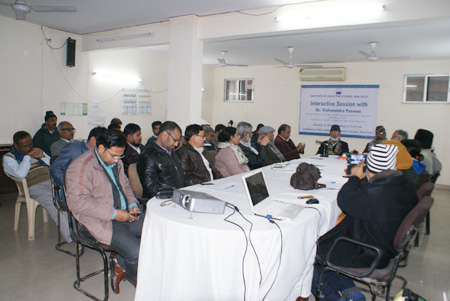
|